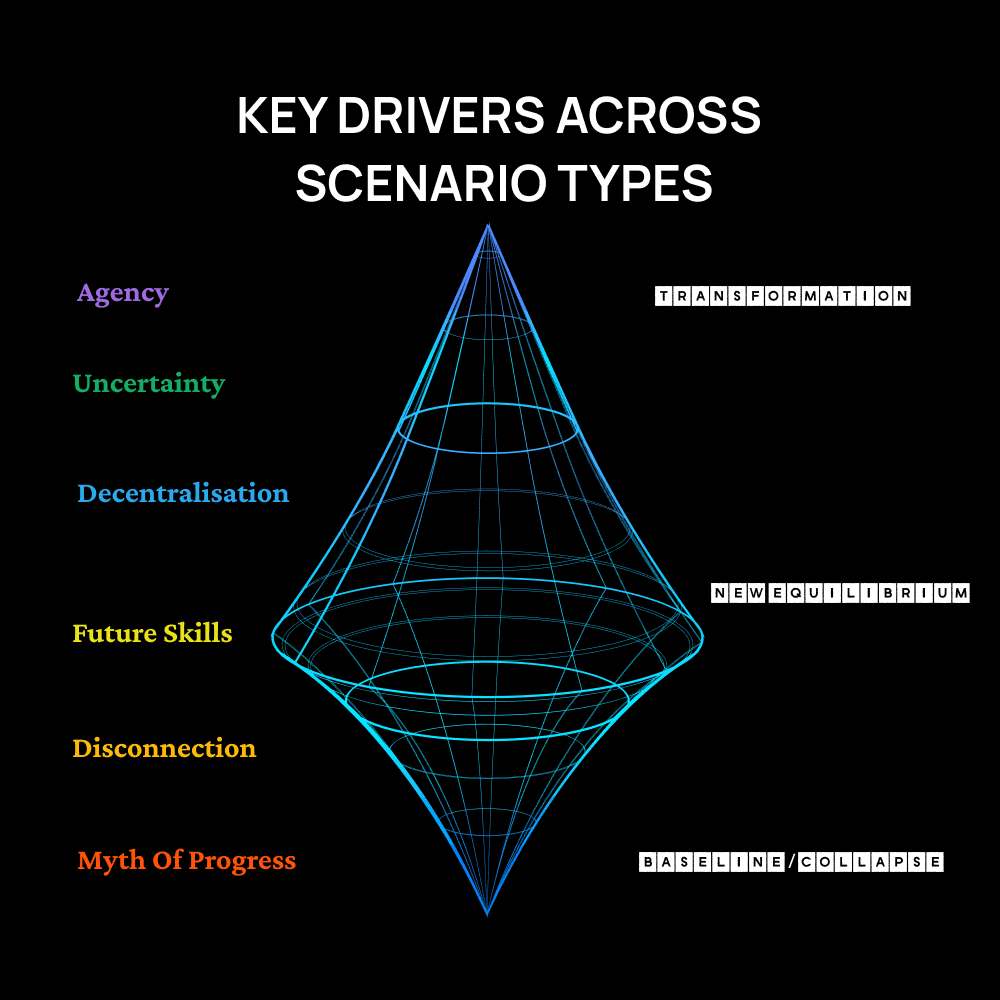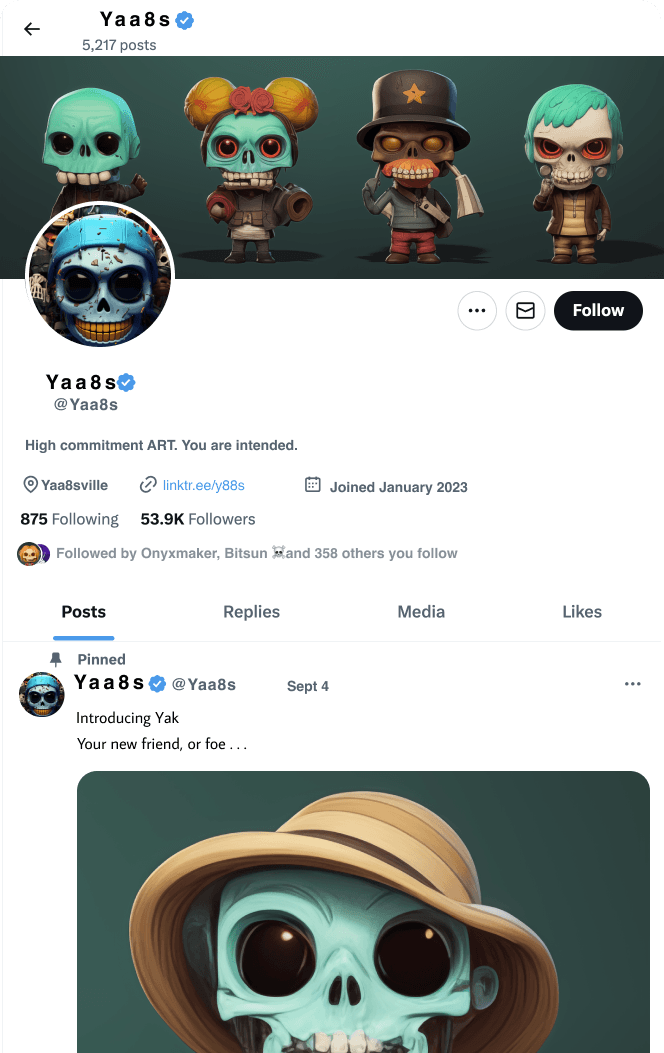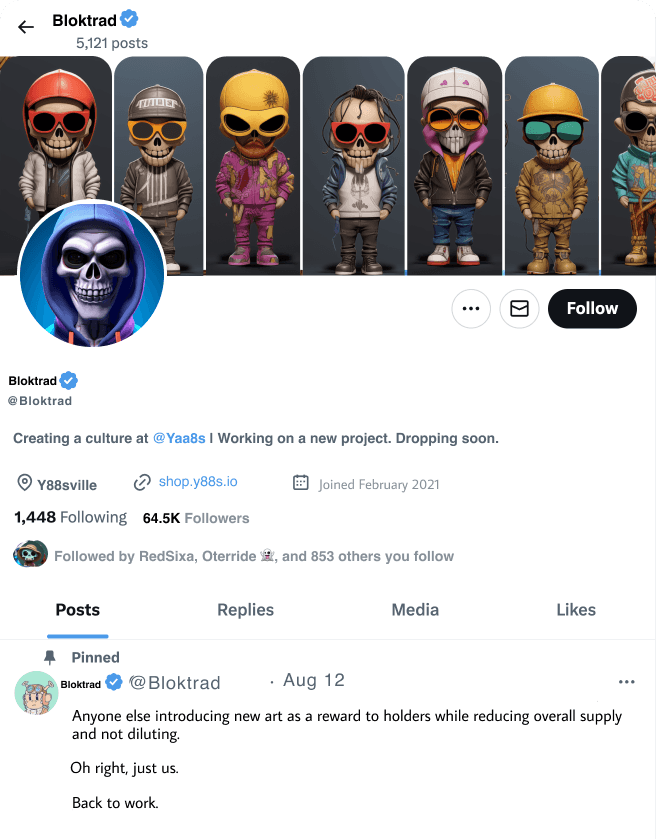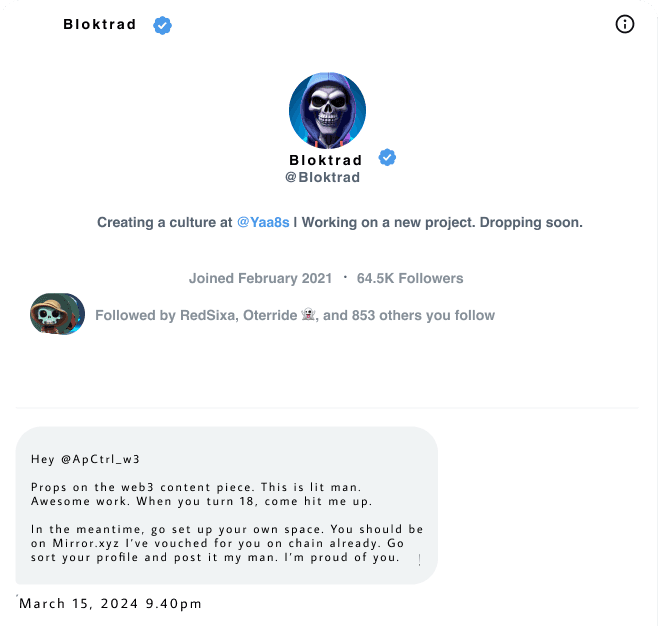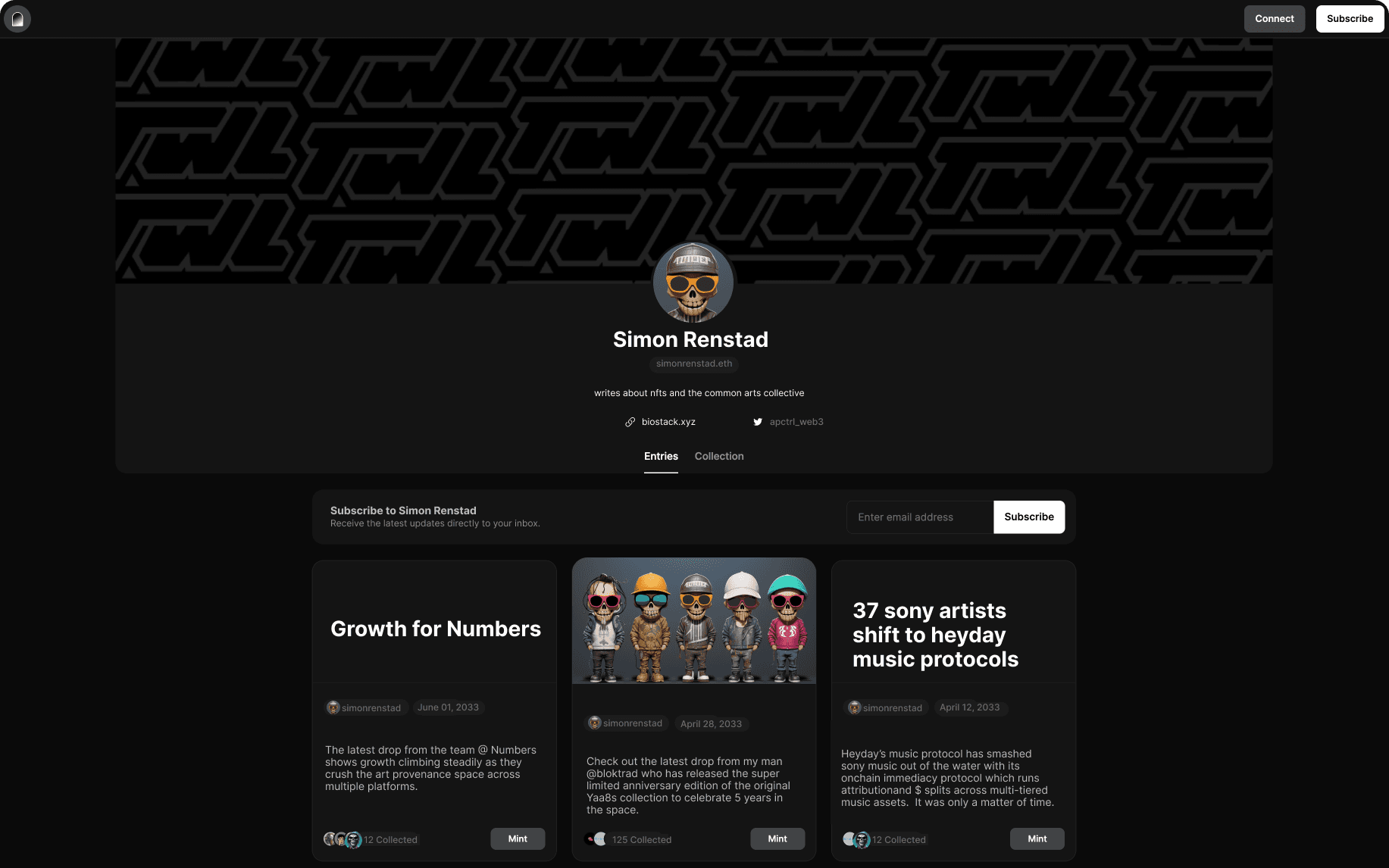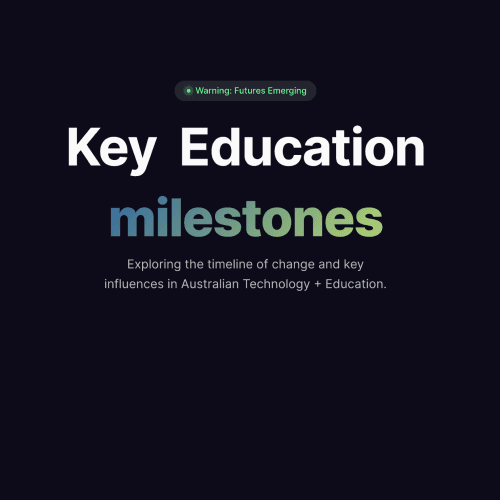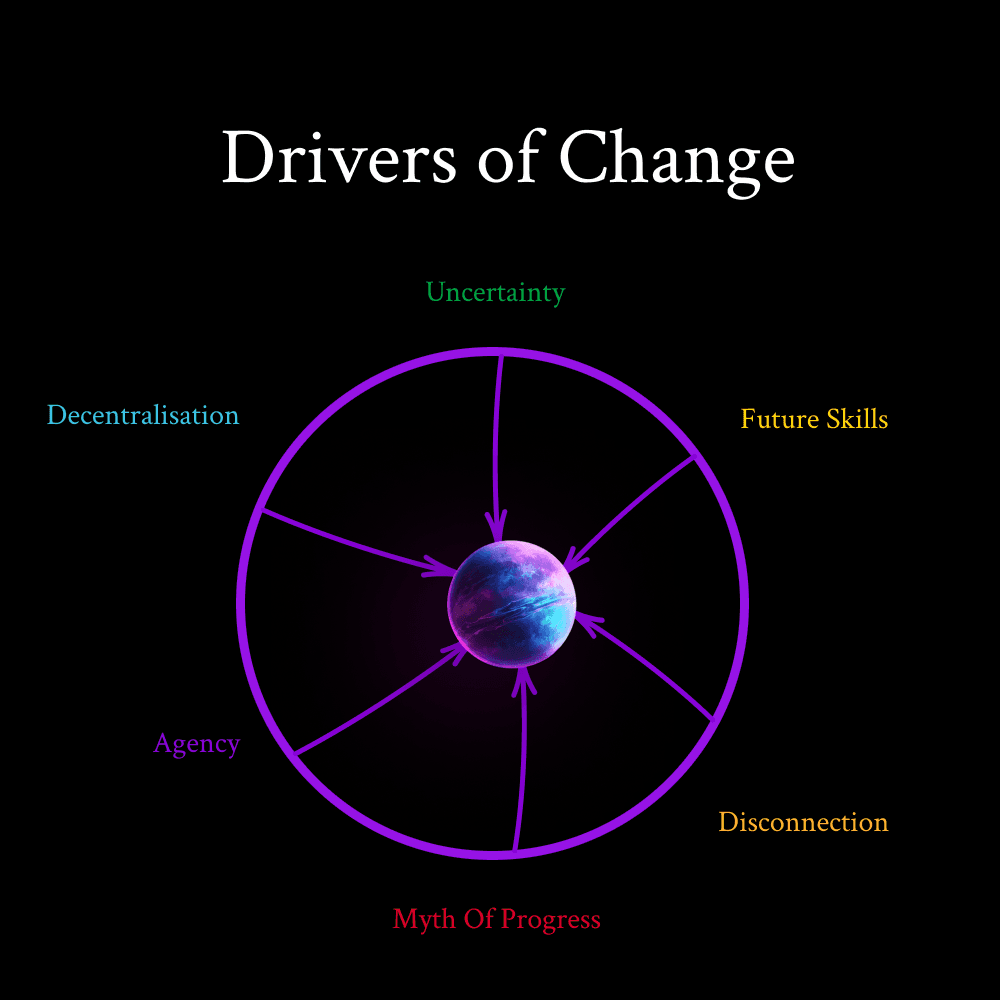Behind the Scenes
Explore the chain of custody from
which this scenarios was developed.
We begin at the beginning…
I did it . . I finally published my first longform essay to mirror.xyz.
Sure it's about web3 provenance protocols and NFT derivatives but hey, that's what I'm into. Who are you to judge? You might not think it's a big deal, some kid doing some blog post to a stupid website but I'm not an academic person. Three years ago, after failing English, I would have told you I wasn't even a smart person. Atleast, that's how I felt. Now I know that was total cap.
My parents insisted I attend the deathtrap formerly known as school until I was 15; which you'd think was torture, but was really just a frustratingly intense waste of my time. I used to sit in class, feigning interest, trying to fly under the radar so the NPC Chalkie up the front speaking yapanese wouldn't catch me responding to my clients on discord. Hell sometimes I'd even crack open my web development projects and get into that instead. I mean, I wasn't lazy or anything.
My attitude towards school might have had something to do with the fact that nobody my age has the appetite for some old dead dude who wrote a bunch of plays years ago, but it's more than that. You see, I have ADHD. Which makes concentration difficult . . and sitting still . . and concentrating on subjects of which I have next to no interest. Which was most of them.
I used to be pretty good at math and got into crypto super early. A lot of my good mates on Twitter were into it and it gave me a rush to see what I could do with a little research. I taught myself most of it using online simulations; I knew I couldn't beat the big whales who did it for a living but I found a different strategy. I built myself a nocode web scanner and set up alerts every time an influential dropped the name of a new coin or a freshly minted token project in a positive post. I had automatic buys scheduled that executed within minutes, I'd hold for 24 hours and then get rid of that baby before the bottom dropped out. It worked for a while, until it didn't. Crypto led to NFTs, where I learned my first lesson the hard way. I found this NFT project called Wonkey Donkey and was instantly hooked. I didn't have the money to mint but I volunteered as a discourse community mod which got me on the white list. Then my parents gave me the money for my birthday, it was $500 and felt like all the money in the world. I minted . . but it turned out to be a rug pull. I was devastated. My parents agreed to reinburse my birthday money if I could identify the red flags I missed and a plan to interrogate any future project to stop it happening again.
I joined a web3 micro-course on open source intelligence tools (OSINT) recommended to me by the guys in my design slack channel . . I have ADHD remember, nothing happens by halves here,😂 and I worked out how to track the digital meta-data and provenance records of both users and assets online. If I'd done that in the first place, I would have seen that the dudes who started the project had no prior proof-of-work, that their domains were registered temporarily and diverted through multiple global server networks and I found a guy listed online as a co-founder, who left the project prior to minting. He deleted his profile but I found a lag file which listed him as the third partner. Must have freaked about being doxxed.
I also bought myself a cold crypto wallet that could handle all the major coins, and set up an eth address for trading and one for holding. There was no way I was going to be that guy again. I had to present my findings to my parents, it was like a project but with no grades. My school friends thought it was hilarious, and probably also a little stupid. But it changed the way I think about data provenance and trust in a major way.
Anyway the NFT collecting led to web3 discourse community modding and token art. I minted my own collection of NFTs which I had designed by a guy I knew. In reality the art was average and the traits were limited, and I had no profile . . so unsurprisingly it flopped. But the designer and I are good mates now, so I wouldn't call it a complete waste of time. One of the NFT creators from the @radi6 project saw some of the PFPs I'd been doing and asked me to do some art. One thing led to another and soon I was building out sites for his test projects. Like all newbies, I started in nocode and worked across all the big platforms. Pretty soon I was modding my own code and creating web components for others to buy. That was pretty cool. I created proof-of-work profiles on all the major art hubs and NFT drop channels; and pretty soon I was developing proper websites for major NFT projects and developing a following on Twitter. Which is kind of hard to maintain because my crowd is so US-centric, hence why I needed to make myself available in class while the Chalkie NPC was yapping.
Some banking dude who follows me suggested a few books I should read; my mum nearly fell off her chair when the amazon box arrived with books that not only had I ordered, but paid for too. I mean . . you gotta stay current. I set up a community for alphas like myself, and made some of my best mates there. Before you freak out I had physical friends too . . it's just that they weren't into what I was into. And whatever I'm into . .is always in a major way. Bet.
The founder of the @Yaa8 project which I'd been doing some design for, saw a post I made about saving up for a @Yaa8 NFT. They're about $5,000 so you can see that I was playing a long game. He DM'd me and offered me a deal. If I wrote some posts for his work discord about data provenance and the challenges of ownership verification off-chain, he'd loan me one of his NFTs for my PFP. He'd seen my posts about immutable content and web3 provenance protocols, and wanted to upskill his digital agency team.
Loaning NFTs is not something you do in the web3 space. Especially with so much algorithmic junk and authenticity issues, anyone who uses an NFT that isn't trackable on-chain is considered a hack or worse still, a thief. But this guy just gave me one of his NFTs indefinitely, can you believe it? Transferred it to me on-chain, just like that. Of course he made me explain my holding set up to make sure I didn't lose it but after the Wonkey Donkey rug pull, I was all over that like a rash.
So I started writing for the @Yaa8s founder - @bloktrad. At first just short posts outlining critical provenance issues and authenticity feedback loops. My failures came full circle when I started writing about digital intelligence tools and methodologies; his people couldn't believe I'd learned all this from open source but you can find pretty much anything on the web if you look hard enough.
Then he asked me to write a longform piece about web3 provenance protocols; so I wrote about collectable embeds and how splits are changing the game for social attribution network graphs, and the structures creators use for attribution and economic compensation.
I sent it to him a couple of times and he gave me some feedback, but mostly I think he was happy. I finally finished it and when I sent it him the final cut . . I got this DM back 👆 I'm telling you this guy is the GOAT
It's been 10 years since I first started trading in crypto and 8 years since I parted company with what is now called OpenCampus - (the system formerly known as high school), which is almost completely unrecognisable. In 2027 a wave of privatisation swept across the educational landscape and more than 35% of private schools broke ranks with legacy church structures and pivoted to for-profit models led mostly by, you guessed it . . Big Tech . By the end of 2029, these for-profit schools formed the Education Commons Collective and in 2031 expanded the Collective worldwide.
OpenCampus reformed as a series of local and international networks. Learning is now available through a series of decentralised transparent blockchain-based platforms maintained by community white hats. Peeragogy is the dominant educational approach now which doesn't surprise any of us. Content is open source and co-created by domain masters and students alike; while learners connect with personal learning coaches regularly to structure pathways that align with problem-based meta maps. These meta maps eventually form pathways towards early work opportunities (what we used to call careers), but unlike the school I went to, there's no age limit and people tend to get into it early nowadays.
Besides, work doesn't mean what it used to. The idea of focusing your final school years training for a job with somebody else feels kind of ridiculous now. Like the education version of an old school "prepper" 😂. I mean . . obviously peoples still work for others, but even bigger businesses tend to operate micro-system models, so you still feel like you're working for a startup. No doubt there's some guru organisational theory about why this approach has increased staff retention and productivity, but mostly I think people just got tired of imbalance and boredom.
At OpenCampus kids create their own interdisciplinary work projects based around personal passions, for some kids . . even just finding the passion can be a big step. I think one of the mandates is the selection of one wicked collaborative challenge project each year . . you know, like tackling the water crisis or climate refugees. But apart from that kids are free to pick almost anything, their learning coaches will help them shape it into something robust and purposeful. They mint these projects as Scholar NFTs, so they have them on-chain as proof-of-work which they can stack for subsequent connections. And by the way . . proof of ‘work’, is whatever learners say it is.
Following your weird interest to the depths of its complexity is always going to be a more engaging and transformative experience than memorising sonnets. Bet. It's weird that schools used to grade us and force us to memorise and regurgitate a load of bollocks that nobody ever remembered. Funny thing is . . . I still remember the security protocols I learned when I lost my first NFT buy to a rug pull. Just goes to show you doesn't it . . . Each student belongs to a series of learning communities-of-practice, much like the unofficial ones I cultivated for myself in the old days of discord and slack. From what I can see, despite early misgivings from the boomers, these OpenCampus hubs have been transformative. They offer a network of different learning mode spaces which learners can access at various stages of their problem-project pathways; super labs offer powerful physical technology, scientific equipment, creative production and manufacturing facilities, whilst immersive arenas and virtual cells invite exploration at every scale, time period and subject matter imaginable.
The government's role has been reduced to community tech infrastructure and device supply. Who would have thought? The good news is that every region in the country has stable high speed internet and the latest fully subsidised laptops which get replaced every three years. It's hard to believe . . had I been just a few years younger, that I could have literally developed my own path with support from inside the system. Still, I'm not feeling hard done by, there were plenty of people in my community who stepped up and reached sideways to scaffold me. Just as I've done for others along the way.
As for me? . . . I'm a professional writer, can you believe that?! The guy that only went by ApCtrl_web3 because he was too freaked to put out his real name. Yep that guy who pretty much failed English. That's me . . Simon Renstad and now I get paid to write for a living. Not a salary mind you, it's all attribution splits and networked commerce but it's more than enough. And it's not just about the money. When you work across these web3 platforms like I do, it's the acknowledgement from people who have read your work or better still, who have built on it and included you in their creative attribution protocols (with on-chain acknowledgement), that makes you get up in the morning. Want to guess who my first paid subscriber was? . . @bloktrad. Facts.
I'm also a domain master for OpenCampus; I work across three areas - mostly Crpto, NFT design and lately, a new area I'm calling the Common Arts Collective. I co-create domain knowledge and problem-based meta maps with the hardcore students who are really into it; I hold regular digital spaces and physical meetups with students and learning coaches all over the world. All paid for by OpenCampus which is pretty rad. There's a couple of guys in my crypto class who are out of this world . . they're teaching me stuff that would blow your mind. One of them is like sixteen I think and the other is only twelve. It's brilliant. That's the kind of stuff that makes you smile.
It's funny you know, when I was younger . . I was the one my parents worried about. How would I cope if I didn't do well at school? Why couldn't I just be more engaged with the Chalkies? And now, it seems like the system has finally caught me with me. Seems like I was never actually that far off the track I was meant to be on. I used to tell my mum I was a pioneer, and unbeknownst to me, I might actually have been right.

